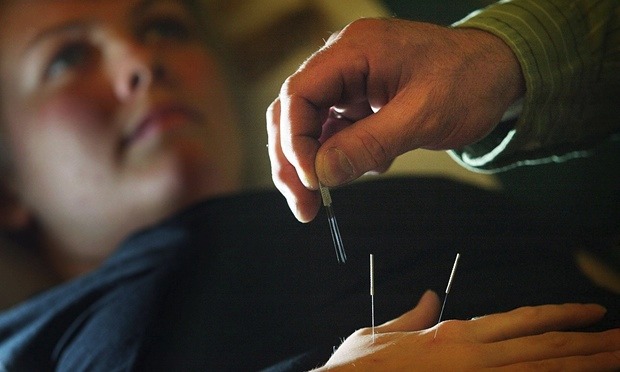Should Acupuncture be used more widely in the NHS?

‘It is not a cure-all, and should be open to scrutiny. But there are conditions for which acupuncture works,’ says Dr Colin Carr. Photograph: David Cheskin/PA
Every woman needing pain relief while giving birth at University College London hospital (UCLH) is offered acupuncture, with around half of the hospital’s midwives specially trained to give the treatment. UCLH is far from typical in this respect, though: acupuncture is not standard throughout the UK and many health practitioners claim patients are often denied access to it through the NHS because of entrenched scepticism from sections of the medical establishment.
Dr David Carr is one of a number of clinicians who is determined to change that. A clinical lecturer in maternal foetal medicine at St George’s, University of London, he is also an accredited acupuncturist working at the Royal London hospital for integrated medicine (RLHIM). In 2013 he established a flagship maternity acupuncture service at UCLH NHS trust, which has trained 120 of its midwives.
He has also trained a further 100 midwives, obstetricians and anaesthetists throughout the UK since January 2014 – funded by the UCLH charity – to provide acupuncture to women in labour through a one-day course endorsed by the British Medical Acupuncture Society.
Carr says: “There are conditions for which acupuncture works and others where it doesn’t. It is not a cure-all, and should be open to scrutiny. But the focus of my work is for acupuncture to become a standard part of midwifery training, and at the same time change perceptions among clinicians about its appropriate use for a whole range of other conditions.”
The form of acupuncture in use in the NHS, and being taught by accredited trainers like Carr, is western medical acupuncture (WMA) – evolved from Chinese acupuncture but using current medical knowledge. The difference is that WMA has discarded mystical concepts like yin, yang and qi, and considers itself to be part of conventional medicine rather than an “alternative”.
The UK lags behind many other European countries in its support for acupuncture. Just 2,500 medical professionals here are qualified to practice it, compared with 45,000 in Germany. The National Institute for Clinical Excellence (NICE) recommends WMA specifically for the treatment of only two conditions – lower back pain (which costs the NHS £1bn a year) and headaches. In Scandinavia its use in childbirth is commonplace.
A growing body of healthcare practitioners believe it should be offered routinely for a variety of conditions, including pain in labour, cancer, musculoskeletal conditions and even irritable bowel syndrome (IBS).
At a time of NHS cuts the use of needles at 8p per unit look attractive. In St Albans, where a group of nurse-led clinics have been using acupuncture since 2008 for patients with knee osteoarthritis, economics have been put under scrutiny. WMA was offered to 114 patients rather than a knee replacement costing £5,000, and 79% accepted. Two years later a third of them had not required a knee transplant, representing an annual saving of £100,000, as estimated by researchers to the St Albans local commissioning group.
Dr Adrian White, a lead researcher, said: “This first evaluation shows the practicability of offering a low-cost acupuncture service as an alternative to knee surgery.”
So why is acupuncture not being used more widely? The difficulty of proving its efficacy is clearly one of the biggest stumbling blocks. An analysis of 29 studies of almost 18,000 patients found acupuncture effective in treating chronic pain compared with sham acupuncture. But even treatment proponents question whether a randomised controlled trial – the gold standard of medical research – works, given that faking treatment is nearly impossible.
Emotional responses clearly play their part. Physiotherapist Anna Housley, from University hospital of south Manchester (UHSM), has used it with spectacular results to relieve phantom pain in amputees. She says: “I could have helped more people if some of the doctors had been more open-minded. Although some medics were very supportive, others were not and one doctor told me that he did not see any benefit in acupuncture, and would therefore not refer any patients to me.”
Rebecca Jackson, a physiotherapist specialising in knees and hips at UHSM, classes herself as being a “very medical model” but uses acupuncture on about a third of her patients. She feels professionals like herself need to think outside the medical model.
She describes a woman who had exhausted conventional treatments but could not lift her arms above 90 degrees, but after two 25-minute sessions of acupuncture was able to lift them above her head. Jackson says: “Acupuncture completely challenges all my scientific training and I did not get it at first. But now I almost feel that the proof lies in what you are doing.”
The key, according to professor of gastroenterology at the University of Manchester Peter Whorwell, lies in educating medical students, most of whom are taught nothing at medical schools about a treatment popular with patients. Whorwell, an international expert on IBS says: “Some teaching about acupuncture should be in the curriculum – even in a couple of units. Patients with serious IBS tell me that their GPs will not refer them for acupuncture, but they are making a judgement on something that they do not know anything about.”
Source: The Guardian Healthcare Network







